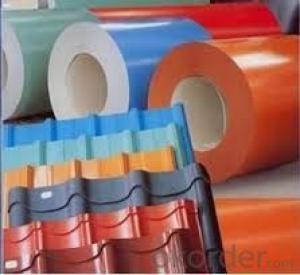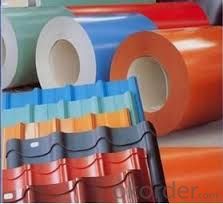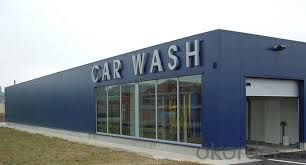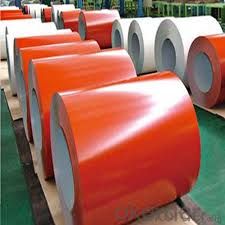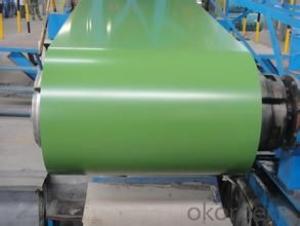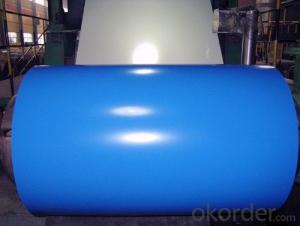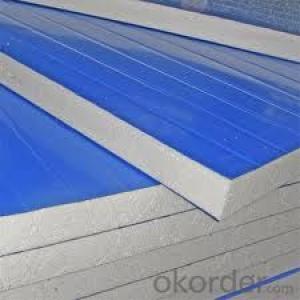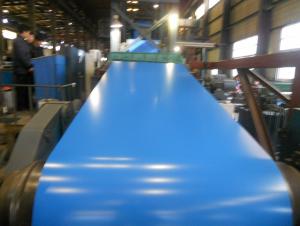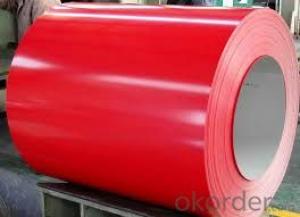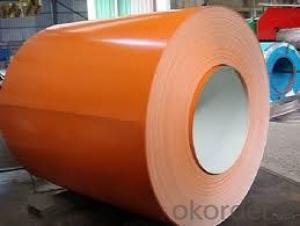Prepainted Cold Rolled /Pre-painted Galvanized Steel Coil/Pre-painted Steel Coil
- Loading Port:
- China main port
- Payment Terms:
- TT OR LC
- Min Order Qty:
- 25 m.t.
- Supply Capability:
- 1000 m.t./month
OKorder Service Pledge
OKorder Financial Service
You Might Also Like
Product Description
Commodity: Hot dipped galvanized steel coil
Size: Thickness: 0.20mm to 1.2mm; Width: 500mm to 820mm
Surface finish: Regular spangle; Small spangle
Surface treatment: Chromated passivation
Zinc coating: Z08, Z12, Z18
Packing: Mill's standard packing for exporting
Usage: used in the industries such as construction ,cold rolling forming and electro mechanics manufacturing, household electric appliance manufacturing and etc
Standard adopted: GB/T2518-1998;Also we supply such steel strips according to JIS,ASTM standard to meet users'requirements.
Steel grade: Q195,Q195L,SPCC(Other material require agreement )
Equivalent standard: JIS G3302 1998 or ASTM A653M/A924M 1998
Price Terms: FOB, CIF Term
Payment Terms: T/T, L/C at sight
Delivery: 15 days after receiving your valid L/C/down payment
andard | EN 10142 | DX51D+Z, DX52D+Z, DX53D+Z |
JIS G3321 | SGCC, SGCD, SGCDD, SGC400 | |
ASTM A792M | CS type C, CS type B, DS, SS250 | |
Base Metal | Cold rolled steel coils SPCC, SPCD, SPCE, DC01, DC03, DC04, CS, DS, DDS, Q195, Q250, Q350 | |
Thickness | 0.14mm-3.0mm | |
Width | 600mm-1600mm | |
Coil ID | 508mm, 610mm | |
Zinc coating | 60g/m2-450g/m2 | |
Surface treating | chromium free passivation, chromium passivation, fingerprint resistant, oiled | |
Spangle types | Minimal spangle, zero spangle, regular and big spangle | |
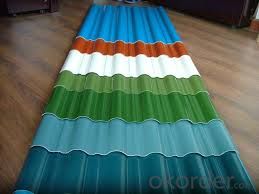

- Q: What are the different types of steel coil grades and specifications?
- In the market, one can find a variety of steel coil grades and specifications. These grades and specifications cater to different industry needs and applications. Several commonly used types include: 1. Hot Rolled Steel Coils: These coils are manufactured by heating the steel above its recrystallization temperature and then rolling it at a high temperature. They are often used in applications where dimensional accuracy and surface finish are not crucial. 2. Cold Rolled Steel Coils: Cold rolled steel coils are produced by subjecting hot rolled coils to further processing in cold reduction mills. This process enhances surface finish, tightens tolerances, and increases strength compared to hot rolled coils. They find wide applications in the automotive, construction, and electrical industries. 3. Galvanized Steel Coils: These coils are coated with a layer of zinc to protect them from corrosion. Galvanization improves the durability and longevity of the steel coils. They are commonly used in roofing, fencing, and automotive body parts. 4. Stainless Steel Coils: Made from a combination of iron, chromium, and other elements, stainless steel coils offer excellent corrosion resistance and high strength. They are widely used in industries such as food processing, chemical, and medical, where hygiene and corrosion resistance are critical. 5. High-strength Low-alloy (HSLA) Steel Coils: HSLA steel coils are designed to possess higher strength and improved formability compared to conventional carbon steels. They are commonly employed in structural and transportation applications where weight reduction and high strength are required. 6. Electrical Steel Coils: Also known as silicon steel or transformer steel, these coils are specifically designed for electrical equipment like transformers, motors, and generators. They exhibit low core losses and high magnetic permeability, ensuring efficient energy transfer. 7. Tool Steel Coils: Tool steel coils are specially formulated to possess high hardness, wear resistance, and toughness. They are commonly used in the production of cutting tools, dies, and molds. These examples represent only a fraction of the steel coil grades and specifications available in the market. The choice of the appropriate grade and specification depends on specific application requirements, such as strength, corrosion resistance, formability, and surface finish.
- Q: What are the factors affecting the lifespan of steel coils?
- There are several factors that can affect the lifespan of steel coils. Firstly, the quality of the steel used in the manufacturing of the coils plays a significant role. High-quality steel with proper composition and metallurgical properties tends to have a longer lifespan compared to lower-quality steel. Secondly, the environment in which the steel coils are stored and used also affects their lifespan. Exposure to extreme temperatures, humidity, and corrosive substances can lead to degradation and corrosion of the coils, reducing their lifespan. Proper storage conditions, such as controlled temperature and humidity levels, can help prolong the lifespan of the coils. Thirdly, the handling and transportation of steel coils can impact their lifespan. Improper handling, such as dropping or mishandling during loading and unloading, can cause physical damage to the coils, leading to premature failure. Similarly, rough transportation conditions, such as excessive vibration or impact, can also contribute to the deterioration of the coils and reduce their lifespan. Furthermore, the maintenance and care of the steel coils also play a role in their lifespan. Regular inspection, cleaning, and maintenance can help identify and address any potential issues before they become major problems. Additionally, applying protective coatings or treatments to the coils can help prevent corrosion and extend their lifespan. Overall, a combination of factors including the quality of the steel, storage conditions, handling and transportation, and maintenance practices all contribute to the lifespan of steel coils. It is essential to consider these factors and take appropriate measures to ensure the longevity of the coils.
- Q: Where can you buy a steel polearm in a shop or if someone has a file in Scania than can you sell me one ill buy it for 150k my account is tonypark500
- you dont buy it, you earn it in the lottery cassandra was doing(it passed).
- Q: How are steel coils handled during loading and unloading?
- Steel coils are typically handled using cranes, forklifts, or coil hooks during loading and unloading. The coils are carefully lifted, secured, and transported to their respective destinations. Special attention is paid to ensure proper balance, stability, and safety measures are followed to prevent any damage or accidents during the process.
- Q: What are the common defects found in steel coils?
- Some common defects found in steel coils include surface defects such as scratches, dents, and rust spots. Other defects may include coil breaks, which are cracks or breaks in the steel, as well as wavy edges, uneven thickness, and coil set, which is when the coil has a permanent curvature.
- Q: Why?Which one should i get? I am just starting to learn Guitar. Which one would be better for me? What is the difference? I already got the acoustic nylon but i might return it... if the steel is better.
- Depends on what kind of music you want to play. Nylon string guitars are used for classical music, and sometimes for jazz, occasionally for folk music. Steel string acoustic guitars are used for almost everything else -- rock, pop, country, bluegrass, folk, blues, jazz, you-name-it. Some people will tell you that beginners should start on nylon strings because they're supposed to be softer on your fingertips but unless you plan to continue playing classical or jazz or folk on your nylon string guitar for some time to come, you're wasting your money. If you want to play rock, pop, country or almost anything else, get a steel string guitar, put light-gauge steel strings on it. Your fingertips are going to be sore for the first few weeks no matter what kind of strings you have on your guitar -- you might as well start off on a guitar that will have the sound you want for the kind of music you actually want to play. Nylon string guitars also have wider necks and fingerboards than steel string guitars, so if you have smaller hands, a steel string guitar will probably be more comfortable for you to play. Hope this helps.
- Q: I am getting a barn soon and I was debating between wood, and steel. I think steel would look nicer [painted of course] and I was wondering which is cheaper. Any extra info would be great. Thanks x
- Steel barns are much cheaper, but do require more insulation (they get extremely hot in summer and extremely cold in winter w/o insulation), and they have little to no maintinence. in my opinion though, a better-built wood barn is by far the better choice in the long run. They are much more sturdy, more visually appealing (to me), and if kept up well, will last much longer than a steel barn will. I also like that with a wood barn, during rain/hail/etc.etc. you don't have a deafening clatter that is unavoidable with steel barns.
- Q: What is the most common bullet resistant steel that is used, can certain bullets just not be stopped, also what type of glass is bullet resistant or is that special made.
- any amount of steel, you can find a bullet or cannon big enough to go through it. The WWII battleships had 12 inches of steel, but a torpedo would still put a hole in that. Any bullet, on the other hand, and you can find a thick enough steel to stop it. It's just that the steel may be too heavy to be useful. .
- Q: How are steel coils used in the production of telecommunications equipment?
- Steel coils are used in the production of telecommunications equipment for various purposes, such as creating structural components, housing enclosures, and mounting brackets. The steel coils are often shaped, cut, and formed into different parts that provide strength, durability, and support to the equipment. Additionally, steel coils may be used in the manufacturing of antennas, transmission towers, and other infrastructure elements that are crucial for telecommunications networks.
- Q: Can steel coils be used in the production of furniture?
- Yes, steel coils can be used in the production of furniture. Steel coils can be used to create sturdy frames for furniture such as chairs and sofas. The coils can be shaped and welded together to provide support and durability to the furniture.
Send your message to us
Prepainted Cold Rolled /Pre-painted Galvanized Steel Coil/Pre-painted Steel Coil
- Loading Port:
- China main port
- Payment Terms:
- TT OR LC
- Min Order Qty:
- 25 m.t.
- Supply Capability:
- 1000 m.t./month
OKorder Service Pledge
OKorder Financial Service
Similar products
Hot products
Hot Searches
Related keywords
